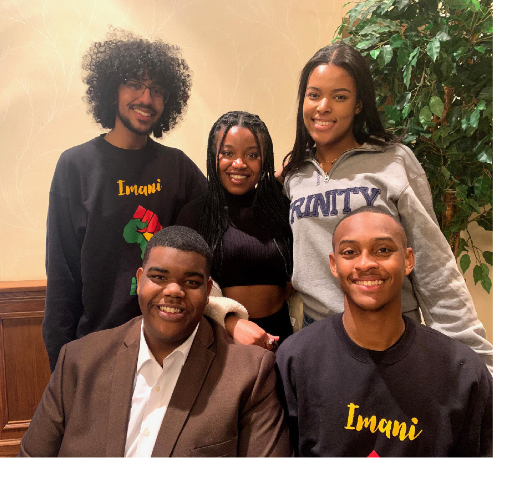Katie Cerulle ’22
Features Editor
The brutal murder of George Floyd this past May sparked protests across the United States, calling attention to the many systems within our society that are coded with underlying racism. These practices within racist institutions are unfortunately nothing new, but are often concealed by both the mainstream media and several American politicians. Trinity College is no exception to these inherently racist policies. In response to the College’s various policies and procedures, a combination of Black organizations titled the Umoja Coalition presented a list of demands to the College seeking to improve the experience of Black students on campus.
The Umoja Coalition is a working group composed of seven Black organizations in the Multicultural Affairs Council (MAC) that are fighting for the rights of Black students on Trinity College’s campus. The coalition is built on infrastructure that has been a part of this campus for upwards of 40 years. “This is all very cyclical, these are problems that persist” states Jederick Estrella ’22, a member of the coalition. Estrella also mentioned that the coalition creates a platform for these Black organizations to come together and speak as a singular, unified voice. On a budgetary level, creating more organizations puts more money into Black organizations and presents more opportunity to throw events. These events, such as the Carribean Student Association’s fashion show or the Hip Hop festival, are attended by hundreds of people and are vital in changing the narrative of and within the Trinity community.
This summer, the Coalition assmbled a list of demands for the College in order to identify the specific changes that must be implemented in order to make our community more equitable. Estrella explains that the list is split into six articles that address different departmental categories of Trinity, separating out the Administration and the Board of Trustees. The Board of Trustees and the Administration handles the financials of the institution, making it vital to hold them individually responsible. “The business model of Trinity College needs to be restructured to take into account the Black students that go here” states Estrella. However, all of the departments that have been addressed are held to a similar list of demands as the Board of Trustees and the Administration, because funding and operations of campus activities go hand in hand, Estrella explained. Also on the list of demands to the faculty is an increase in Black professorship on campus. The lack of representation in some of the most popular majors on campus remains evident, and not having these mentors for BIPOC students create barriers unbeknownst to legacy college students.
After the list of demands was sent, the College released an email that stated their commitment to changing the structure of internal organizations in order to coincide with the demands. They specified their actions in line with the document, separating it into sections and providing a concrete action plan. Estrella explains he is most excited to work with Career Development as they are restructuring the way they operate with BIPOC students in order to be more equitable.
Right now, the Coalition is in the process of electing representation from each of the seven organizations. As the group solidifies their structure as an organization, they will open positions and meetings to the general public. Their operation strategy will run similarly to SGA in the sense that their meetings will encourage community participation. Assuming that COVID eventually ceases and in-person meetings return, showing support for the coalition can be as simple as showing up. The brutal murder of George Floyd in May sparked protests across the country, calling attention to the many systems within our society that are coded with underlying racism. These practices within racist institutions are not new, unfortunately, but have been concealed by mainstream media and many American politicians. Trinity College is no exception to inherently racist policies, and a combination of Black organizations called the Umoja Coalition provided a list of demands to the college in order to improve the experience of Black students on campus.
The Umoja Coalition is a combination of seven Black organizations in the Multicultural Affairs Council that are fighting for the rights of Black students on the Trinity College campus. The coalition is being built on infrastructure that has been part of this campus for upwards of 40 years. “This is all very cyclical, these are problems that persist” states Jederick Estrella ‘22, a member of the coalition. Estrella also mentioned that the coalition creates a platform for these Black organizations to come together and speak as one unified voice. On a budgetary level, having more organizations puts more money into Black organizations and creates more opportunity to throw events. These events, such as the Carribean Association fashion show or the Hip Hop festival, are attended by hundreds of people are vital in changing the narrative of the Trinity community.
This summer, the Coalition put together a list of demands for the College in order to specify the changes that need to be made to make our community more equitable. Estrella explains that the list is split into six articles that address different departmental categories of Trinity, separating out the Administration and the Board of Trustees. The Board of Trustees and the Administration handles the financials of the institution, making it vital to hold them individually responsible. “The business model of Trinity College needs to be restructured to take into account the Black students that go here” states Estrella. However, all of the departments that have been addressed are held to a similar list of demands as the Board of Trustees and the Administration, because funding and operations of campus activities go hand in hand, ‘’ Estrella explains. Also on the list of demands to the faculty is an increase in Black professorship on campus. The lack of representation in some of the most popular majors on campus remains evident, and not having these mentors for BIPOC students create barriers unbeknownst to legacy college students.
After the list of demands was sent, the College released an email that stated their commitment to changing the structure of internal organizations in order to coincide with the demands. They specified their actions in line with the document, separating it into sections and providing a concrete action plan. Estrella explains he is most excited to work with Career Development as they are restructuring the way they operate with BIPOC students in order to be more equitable.
Right now, the Coalition is in the process of electing representation from each of the seven organizations. As the group solidifies their structure as an organization, they will open positions and meetings to the general public. Their operation strategy will run similarly to SGA in the sense that their meetings will be open to the public. Being that COVID eventually ceases and in-person meetings return, showing support for the coalition can be as simple as showing up to these meetings.






+ There are no comments
Add yours